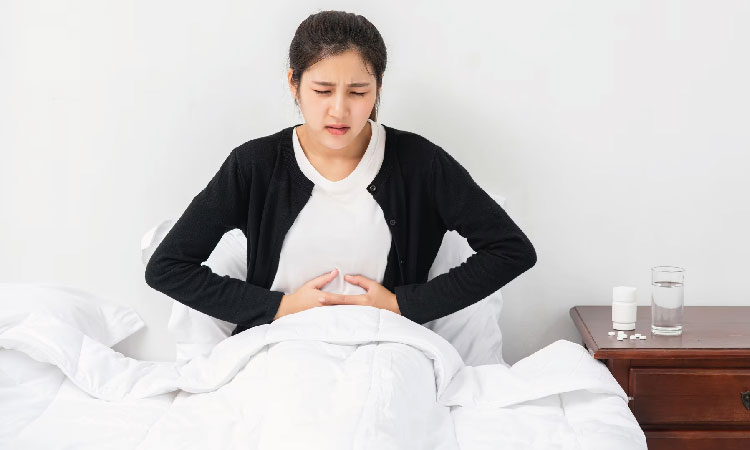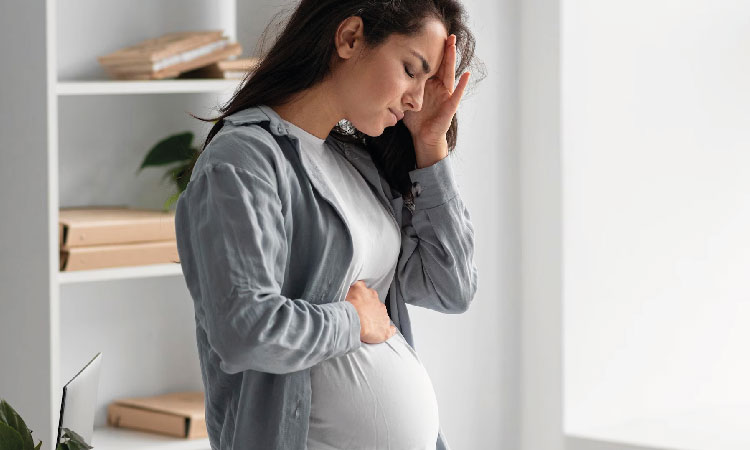Pregnancy is a transformative and remarkable journey for women, but it can also bring about various physical and emotional changes. One common complaint during the first trimester is pregnant belly feels tight and heavy. The experience of a heavy feeling in the stomach during early pregnancy is a common phenomenon that many expectant mothers may encounter. Early pregnancy is a transformative time characterized by significant hormonal changes and adjustments within the body.
Many weird feelings in the stomach during early pregnancy are often attributed to the changes taking place in the uterus and hormonal fluctuations occurring in the body. While experiencing a heavy feeling in the stomach during the early stages of pregnancy can be normal, it is still important to see a doctor for a proper diagnosis and advice. This is so because these sensations are not only related to pregnancy but can also be caused by other conditions, such as gastrointestinal problems.
Can Early Pregnancy Make Your Stomach Feel Heavy?
Our panel gynaecologist Dr Ankita Patel Tayal says, “Yes, it is possible for some women to experience bloating and a heavy feeling in stomach early in pregnancy. Early pregnancy digestive changes are likely the cause of a larger belly or tightness. As the uterus grows larger and takes up more space in the pelvis, pregnant women’s intestines are pulled higher. Stomach tightening in early pregnancy is often described as a sensation similar to menstrual cramps or a mild tightening or pulling feeling in the lower abdomen. It is typically a normal part of the early pregnancy experience and is usually nothing to be concerned about.”
Throughout the first trimester of pregnancy, the body goes through hormonal changes, with a rise in progesterone levels being the most notable. This hormone helps to relax the uterine muscles to make space for the growing fetus. It is possible that other smooth muscles in the body, like the ones in the digestive system, will also be impacted. This slows down digestion, which results in more gas and constipation. This may contribute to a heavy feeling in the lower abdomen in early pregnancy.
Related Reading: When Should I Stop Wearing Tight Jeans During Pregnancy
Furthermore, increased blood flow to the pelvic area may contribute to a sensation of pressure or fullness in the lower abdomen. In order to accommodate the growing embryo, the uterus also starts to thicken and expand, which may make some women feel heavy or slightly uncomfortable in the lower abdominal region.
However, it is important to note that stomach tightening or cramping can also be a sign of other conditions or complications. If the pain is severe, persistent, or accompanied by other concerning symptoms such as heavy bleeding, fever, or dizziness, it is important to seek medical advice from a healthcare provider to rule out any potential issues.
Why Does My Stomach Feel Heavy During the First Trimester?

Experiencing a heavy stomach during the first trimester of pregnancy is a common concern for many women. Understanding the reasons behind this discomfort can help expectant mothers better manage their symptoms and alleviate some of the associated discomfort.
Calculate Due Date With LMP
8 reasons why pregnant women may experience tightness in the stomach during pregnancy’s first trimester are listed below:
1. Hormonal changes
During early pregnancy, hormonal changes play a significant role in preparing the body for pregnancy and supporting the growth and development of the fetus. One hormone that plays a crucial role in pregnancy is progesterone. This hormone can contribute to a heavy feeling in stomach in early pregnancy.
Progesterone is responsible for maintaining the thick lining of the uterus, which is necessary for implantation and supports the early stages of pregnancy. It also helps relax the smooth muscles of the uterus and prevent contractions that could potentially lead to a miscarriage.
Progesterone can, however, also affect the smooth muscles in the gastrointestinal tract and other parts of the body, slowing the process of digestion1. This may result in a number of digestive symptoms, such as tightness or cramping in the stomach.
Related Reading: Implantation Cramps Or Periods- 8 Ways To Know
2. Expanding uterus
During pregnancy, the uterus undergoes significant changes to accommodate the growing fetus. As the pregnancy progresses, the uterus expands and stretches to create space for the developing baby.
This expansion can cause the surrounding ligaments and muscles to stretch and tighten, leading to a sensation of tightness in the stomach.
Related Reading: 12 Signs Of Healthy Baby In Womb- Trimester Wise
3. Increased blood volume
Pregnancy triggers an increase in blood volume to support the developing fetus. The higher blood volume can lead to added pressure on the blood vessels, including those supplying the stomach.
Sometimes high blood pressure damages the blood vessels in the digestive system, causing swelling and fluid retention that may cause bloating, discomfort, and a heavy feeling2.
4. Morning sickness
Nausea and vomiting, commonly known as morning sickness, are prevalent during the first trimester. It is common for women to experience stomach tightening or cramping along with morning sickness during early pregnancy. Hormonal changes and increased sensitivity of the digestive system are common causes of morning sickness, which includes symptoms such as nausea and vomiting.
These changes can lead to contractions in the stomach and intestines, resulting in stomach tightening or cramping sensations3.
5. Constipation
Pregnancy hormones can also affect the muscles responsible for moving food through the digestive system, potentially causing constipation. When stool accumulates in the intestines, it can lead to bloating and a heavy feeling in the stomach4.
6. Gas and bloating
Digestion may be impacted by pregnancy-related hormonal changes. This might result in more gas and bloating, which might make your stomach feel uncomfortable or tight.
7. A high level of sensitivity to specific foods
Pregnant women often develop heightened sensitivity to specific foods. When a person has a sensitivity to certain foods, their body may react negatively to the ingestion or exposure to those particular food substances. It is possible for stomach tightness, pain, or discomfort to result from a high level of sensitivity to a particular food5.
In some cases, the stomach muscles can contract or tighten in response to food sensitivity, resulting in a sensation of tightness or discomfort. Spicy, greasy, and acidic foods are common culprits that can exacerbate these symptoms.
Related Reading: 9 Natural Remedies For Allergies During Pregnancy That Are Perfectly SAFE
8. Mood and psychological aspects
The first trimester is a period of adjustment, both physically and emotionally. Pregnancy hormones can influence mood, and stress and anxiety are not uncommon during this time. These emotional factors can impact the digestive system, leading to symptoms such as a heavy stomach, nausea, and changes in appetite. It has been found that abdominal discomfort and emotions are interrelated6.
When Does Heaviness Start In Pregnancy?

Stomach heaviness can vary among pregnant women and may occur at different times during pregnancy. Generally, as pregnancy progresses, the growing uterus puts pressure on the organs in the abdominal cavity, including the stomach, which can lead to a sensation of heaviness. The first trimester of pregnancy is often when abdominal tightness starts. Your uterus enlarges in an effort to hold the growing baby, which is the main cause of stomach tightening at this phase.
However, during the first trimester (weeks 1-12), the uterus is still relatively small and positioned low in the pelvis, so stomach heaviness is less likely to be experienced during this time. Yet, some women may start to feel bloated or experience slight discomfort due to hormonal changes and increased blood flow to the pelvic area.
As the second trimester (weeks 13-27) begins, the uterus gradually expands and rises above the pelvic cavity. This growth can result in increased pressure on the stomach, leading to feelings of heaviness, fullness, or discomfort after eating. Additionally, hormonal changes during pregnancy can affect digestion and lead to symptoms such as heartburn or indigestion, which may contribute to the sensation of stomach heaviness.
In the third trimester (weeks 28-40), the uterus reaches its largest size as the baby continues to grow. By this stage, stomach heaviness can become more prominent as the expanding uterus puts further pressure on the stomach and other abdominal organs. The baby’s position and movements can also affect how the stomach feels, especially if they press against it or push it upwards.
There is no one-size-fits-all pregnancy experience, and symptoms can vary from woman to woman. It is best to speak with your healthcare provider for individualized advice and direction if you have any worries about feeling bloated or experiencing any other discomfort while pregnant.
How To Cope With Heavy Feeling In Stomach During Early Pregnancy ?
Experiencing a heavy feeling in the stomach during early pregnancy is a common occurrence. Stomach tightening, commonly associated with stress, anxiety, or indigestion, can be an uncomfortable and disruptive sensation during pregnancy. Although stomach tightening can be unpleasant, pregnant women can ease it by exploring several approaches and lifestyle modifications. Dr Ankita Patel Tayal, MD Obs & Gynae, advises a few techniques that could aid in your management of this discomfort.
Here are some coping strategies if your pregnant belly feels tight and heavy:
- Eat small, frequent meals: Avoid large meals, which might stretch your stomach, leading to tightness or discomfort throughout the day. Instead, spread out your meals throughout the day, eating smaller portions more frequently. Some underlying causes of stomach tightening or discomfort may be alleviated by eating small, infrequent meals. Eating smaller portions can improve digestion and prevent the stomach from being stretched too much, which will lessen the feeling of heaviness
- Choose nutritious, fiber-rich foods: A well-balanced diet with adequate vitamins, minerals, and other nutrients can contribute to a healthy digestive system. This can lessen your chance of developing digestive problems or tightness in your stomach during pregnancy. Foods high in fiber, such as fruits, vegetables, whole grains, and legumes, can promote healthy digestion and relieve constipation, which is a common cause of stomach tightening. Fiber adds bulk to the stool, making it easier to pass through the digestive system and prevents abdominal discomfort
- Maintain good posture: Maintaining good posture can help reduce pregnancy-related discomfort. Avoid slouching and try sitting and standing with a straight back. This posture promotes proper digestion, prevents acid reflux, and minimizes the pressure on the stomach
- Engage in light exercise: Gentle exercises like walking, swimming, or prenatal yoga can enhance digestion and relieve the heaviness in the stomach
- Deep breathing exercises: Deep breathing exercises are an excellent technique for reducing stress and relieving stomach tightening. By focusing on slow, deep breaths, you activate the body’s relaxation response, helping to ease tension in the stomach. Practice diaphragmatic breathing, where you breathe deeply into your abdomen, allowing it to expand fully. Hold your breath for a few seconds and exhale slowly. Repeat this exercise for several minutes, allowing your body and mind to relax
- Healthy diet and hydration: Maintaining a balanced and healthy diet is crucial for preventing stomach issues and reducing tightening sensations. Avoid foods that are known to trigger indigestion, such as spicy or greasy foods, caffeine, and alcohol. Instead, opt for a diet rich in fruits, vegetables, lean proteins, and whole grains. Additionally, ensure you stay hydrated throughout the day by drinking an adequate amount of water. Proper hydration supports optimal digestion and helps to prevent stomach-related discomfort
- Wear loose and comfortable clothing: Tight-fitting clothing can exacerbate the sensation of heaviness in the stomach. Opt for loose-fitting, breathable attire that allows freedom of movement and reduces pressure on the abdomen
- Practice relaxation techniques: Stress and anxiety can intensify physical discomfort. Engaging in relaxation techniques like deep breathing exercises, meditation, and prenatal yoga can help reduce stress levels and promote overall well-being
- Use heat or cold therapy: Applying a warm compress or taking a warm bath can soothe abdominal muscles and ease discomfort. Alternatively, some women find relief by placing a cold pack or ice wrapped in a cloth on the stomach
- Get sufficient rest: Fatigue is common during early pregnancy. Ensure you are getting enough sleep and rest when needed. Elevating the upper body with a few extra pillows while sleeping can also help reduce the heaviness and discomfort
Conclusion

It’s common to feel bloated in the early stages of pregnancy. Having a tight stomach during pregnancy can be an uncomfortable condition. However, people can successfully treat this illness by combining deep breathing techniques, meditation, regular exercise, keeping a good diet, reducing stress, and getting emotional support. Pregnant women may manage their discomfort and enjoy this amazing time in their life by using these coping mechanisms.
However, for specific counsel and direction throughout the pregnancy experience, it is important to speak with a healthcare expert. Never forget to value self-care, put your health first, and treasure the amazing experience of raising a child inside of you.

